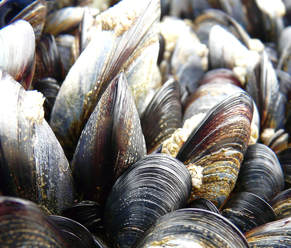 Photo by Tristan Ferne Photo by Tristan Ferne The Pacific Northwest Economic Region (PNWER) works with various stakeholders in the Northwest States and Western Canadian Provinces on securing federal funding to combat invasive mussels including support for watercraft inspection stations. For the past several years the US Congress has appropriated matching funds for the operation of watercraft inspection stations to protect the Columbia River Basin against quagga and zebra mussel infestation. The Senate Environment and Public Works Committee just approved an authorization bill for increased funding for Columbia River Basin protection efforts. This increase will be a great opportunity to leverage the Federal matching funds to double the Northwest States' budgets. Additionally, Congress is in the process of appropriation legislation to continue match funding of inspection stations. Both of these bills are tremendous examples of federal and state cooperation on a critical challenge that could cost the region hundreds of millions of dollars. PNWER has worked with Northwest state and Western Canadian provincial legislators, agencies; U.S. Federal legislators and officials; as well as regional nonprofit associations to support and organize the region’s defense against invasive mussels for the past several years. Recently, PNWER with regional partners and the assistance of our congressional delegation have been able to secure $15 Million U.S. Federal matching funds for watercraft inspection stations programs in the Northwest. The Senate Environment and Public Works Committee on Thursday, May 22 unanimously passed Senate Bill S. 2800 - America's Water Infrastructure Act of 2018. Section 1024 of this bill reauthorizes Federal one-to-one matching funds from the Army Corps of Engineers to states with watercraft inspection stations programs. These inspection stations work to protect the Columbia River Basin from invasive species such as quagga and zebra mussels. The latest bill increases overall Federal funding level in addition to the Columbia River Basin and authorizes new matching funds for the Upper Missouri River protection operations. In the Senate bill, the overall authorization will increase from $40 Million to $80 Million in funds for all aquatic control activities each year. The Pacific Northwest is the only region in the United States that does not have established populations of invasive quagga or zebra mussels, which multiply quickly and are easily transported across jurisdictions on boat hulls and in ballast tanks. Quagga and zebra mussels disrupt native fish habitats and destroy aquatic ecosystems in infested waterways. An invasion will rapidly foul and damage the operations of hydropower, irrigation, fish hatcheries, and municipal water facilities vital to our region’s economy at a cost of $500 million annually, according to an economic impact assessment for the region. Related to Federal invasive species funding, on May 24 the Senate Appropriations Committee advanced the FY2019 Energy and Water Development Senate Bill S. 2975 and Related Agencies Appropriations Act. The appropriation funds programs and critical infrastructure projects administered by the Army Corps of Engineers and Bureau of Reclamation authorized in Section 1039 of the WRRDA related to invasive species watercraft inspection stations in the Columbia River Basin. This appropriation will continue to match up to $ 6 million in Federal funds. The Pacific NorthWest Economic Region (PNWER) is a public/private non-profit created by statute in 1991. Member jurisdictions include Alaska, Idaho, Oregon, Montana and Washington, and the Canadian provinces and territories of British Columbia, Alberta, Saskatchewan, the Northwest Territories and Yukon. PNWER's mission is to increase the economic well-being and quality of life for all citizens of the region; identify and promote "models of success;" and serve as a conduit to exchange information. Background: Aquatic Plant Control Program. Of the funding recommended for the Aquatic Plant Control Program, $1 million shall be for activities for the control of flowering rush. Of the funding recommended for the Aquatic Plant Control Program, $5 million shall be for nationwide research and development to address invasive aquatic plants; within this funding, the Corps is encouraged to support cost-shared aquatic plant management programs. Of the funding recommended for the Aquatic Plant Control Program, $6 million shall be for watercraft inspection stations, as authorized by section 1039 of the WRRDA, and related monitoring. PNWER report: Advancing a Regional Defense Against Dreissenids in the Pacific Northwest |
Archives
August 2023
Topics
All
|
|
World Trade Center West
2200 Alaskan Way, Suite 460 Seattle, WA 98121 |
|
